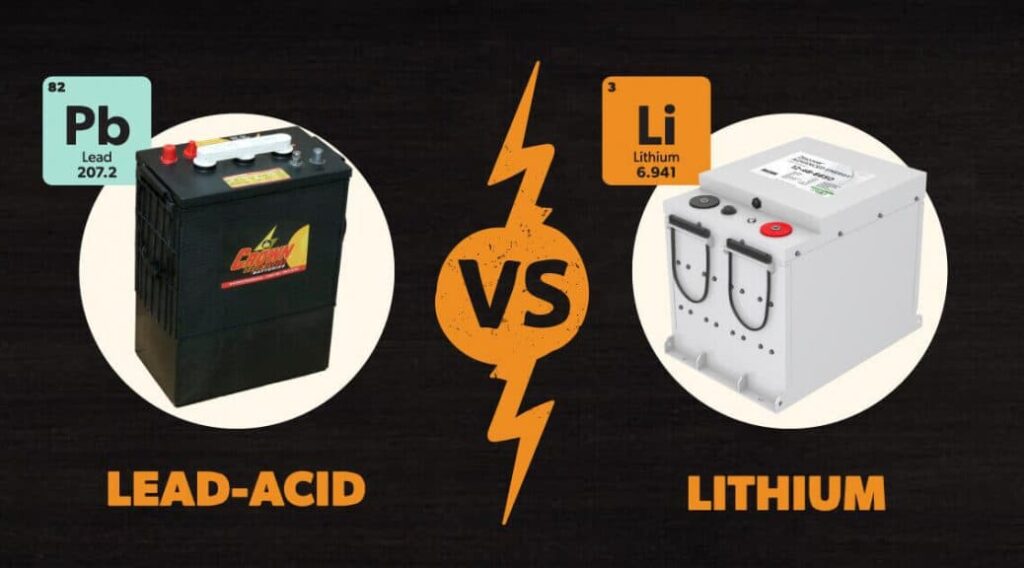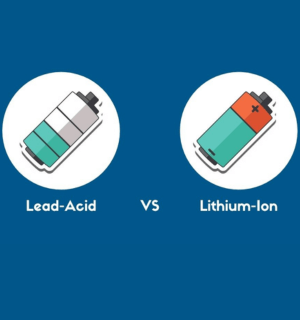When it comes to selecting the right battery for your alarm system, two popular options are lithium-ion and lead-acid batteries. Each type has its own advantages and features that make it suitable for specific applications. In this article, we will compare the two battery types to help you determine which is the best choice for your alarm system.
An alarm system plays a crucial role in protecting homes and businesses. To ensure its reliable operation, a backup power source is essential, and batteries serve that purpose. Understanding the differences between lithium-ion vs. lead-acid batteries can help you make an informed decision for your alarm system.
In this article, we explore the comparison between lithium-ion vs. lead-acid batteries for alarm systems, helping readers choose the best option. We emphasize the importance of selecting the right battery to ensure uninterrupted power supply during outages.
The advantages of lithium-ion batteries include higher energy density, longer lifespan, faster recharge times, and compact size. On the other hand, lead-acid batteries are known for their affordability, wide availability, and durability. Factors such as power requirements, longevity, budget, and maintenance are discussed to guide the decision-making process. Proper installation and regular maintenance are highlighted for optimal performance.
The article concludes by emphasizing the need to consider individual needs and consulting professionals when selecting the ideal battery for an alarm system. FAQs addressing common questions are provided to further assist readers in making informed choices.

Understanding Alarm Systems
Before diving into battery options, it’s important to have a basic understanding of alarm systems. These systems consist of various components such as sensors, control panels, and sirens. They are designed to detect potential threats and alert occupants or authorities, providing security and peace of mind.
The Role of Batteries in Alarm Systems
Batteries act as critical backup power sources for alarm systems. They ensure that the system remains operational during power outages, enabling continuous protection. Selecting the right battery is essential to maintain the effectiveness of your alarm system.
Lithium-Ion Batteries: Advantages and Features
Lithium-ion batteries have gained popularity due to their superior characteristics. They provide numerous benefits over lead-acid batteries, including:
Higher Energy Density: Lithium-ion batteries provide a higher energy density, allowing them to store more power in a smaller and lighter package.
Longer Lifespan: These batteries have a longer lifespan and can endure a greater number of charge-discharge cycles.
Faster Recharge Times: Lithium-ion batteries have shorter recharge times compared to lead-acid batteries, ensuring quicker recovery after power outages.
Lower Self-Discharge: Lithium-ion batteries exhibit a lower self-discharge rate, meaning they retain their charge for longer periods of inactivity.
Compact and Lightweight: These batteries are compact and lightweight, making them easier to install and handle.
Lead-Acid Batteries: Advantages and Features
Lead-acid batteries had been widely used for many years. They possess certain advantages and features, including:
Proven Technology: Lead-acid batteries are a mature and well-established technology with a proven track record.
Lower Cost: These batteries are generally more affordable compared to lithium-ion batteries.
Wide Availability: Lead-acid batteries are readily available and can be purchased from various suppliers.
Robust and Reliable: They are known for their durability and ability to withstand harsh environmental conditions.

Factors to Consider
When deciding between lithium-ion and lead-acid batteries for your alarm system, several factors should be taken into consideration:
Power Requirements: Evaluate the power demands of your alarm system. If it requires high bursts of power or operates in extreme conditions, lithium-ion batteries may be more suitable.
Longevity: Consider the expected lifespan of the batteries. Lithium-ion batteries generally have a longer lifespan in comparison to steer-acid batteries.
Budget: Assess your budget and determine the cost implications of each battery option. Lead-acid batteries are typically more affordable upfront, but the total cost of ownership may vary.
Maintenance: Evaluate the maintenance requirements of each battery type. Lead-acid batteries may require periodic maintenance, such as checking electrolyte levels and ensuring proper ventilation.
Choosing the Samsung 26H 18650 Battery: Optimal Power Solution for Alarm Systems
When it comes to selecting the best battery for alarm systems, the Samsung 26H 18650 Battery stands out in the realm of lithium-ion options. In the perennial debate between lithium-ion and lead-acid batteries, the Samsung 26H 18650 Battery brings numerous advantages to the table.
With its compact size and impressive energy density, this lithium-ion powerhouse offers longer-lasting performance and higher capacity compared to traditional lead-acid counterparts. The Samsung 26H 18650 Battery ensures a reliable and consistent power supply, critical for alarm systems to function optimally.
Additionally, it boasts a longer lifespan, lower self-discharge rate, and faster charging capabilities, making it a practical choice for alarm system installations. Say goodbye to the bulky and cumbersome lead-acid batteries and embrace the efficiency and performance of the Samsung 26H 18650 Battery for your alarm system needs.
Choosing the Best Battery for Your Alarm System
To make an informed decision, consult the manufacturer’s recommendations and guidelines for your specific alarm system. Consider the power requirements, longevity, budget, and maintenance factors discussed earlier. Additionally, seek advice from professionals or consult with experts in the field to ensure you select the best battery for your alarm system.
Installation and Maintenance
Proper installation and regular maintenance are crucial for maximizing the performance and lifespan of your chosen battery. Follow the manufacturer’s instructions for correct installation, wiring, and any specific considerations. Conduct regular checks on the battery, including monitoring voltage levels, inspecting for corrosion, and ensuring proper ventilation for safety and optimal performance.
Ending
Choosing the best battery for your alarm system requires careful consideration of factors such as power requirements, longevity, budget, and maintenance. Both lithium-ion and lead-acid batteries have their own advantages and features, catering to different needs and preferences. By assessing these factors and consulting with professionals, you can make an informed decision that ensures the reliable and efficient operation of your alarm system.
FAQs
Can Lead-Acid Batteries Be Used in All Alarm Systems?
Lead-acid batteries can be used in many alarm systems, but it is important to check the manufacturer’s recommendations and guidelines for battery compatibility. Some alarm systems may require specific battery types for optimal performance.
Are Lithium-Ion Batteries More Expensive Than Lead-Acid Batteries?
Yes, lithium-ion batteries generally have a higher upfront cost compared to lead-acid batteries. However, their longer lifespan and performance advantages may offset the initial investment in the long run.
How Long Do Lithium-Ion Batteries Last Compared to Lead-Acid Batteries?
Lithium-ion batteries typically have a longer lifespan compared to lead-acid batteries. They can endure hundreds to thousands of charge-discharge cycles, while lead-acid batteries may require replacement sooner.
Are There Any Safety Concerns With Using Lithium-Ion Batteries in Alarm Systems?
Lithium-ion batteries have built-in safety features to minimize the risk of accidents. However, it is important to follow proper installation guidelines and handle lithium-ion batteries with care to ensure safe operation.
Can I Switch from Lead-Acid to Lithium-Ion Batteries in my Existing Alarm System?
Switching from lead-acid to lithium-ion batteries may be possible, but it depends on the compatibility of your alarm system. Consult the manufacturer’s recommendations and seek professional advice to determine if a switch is feasible and beneficial.

